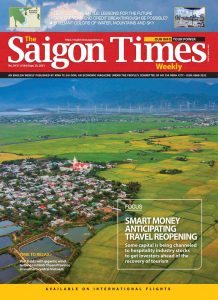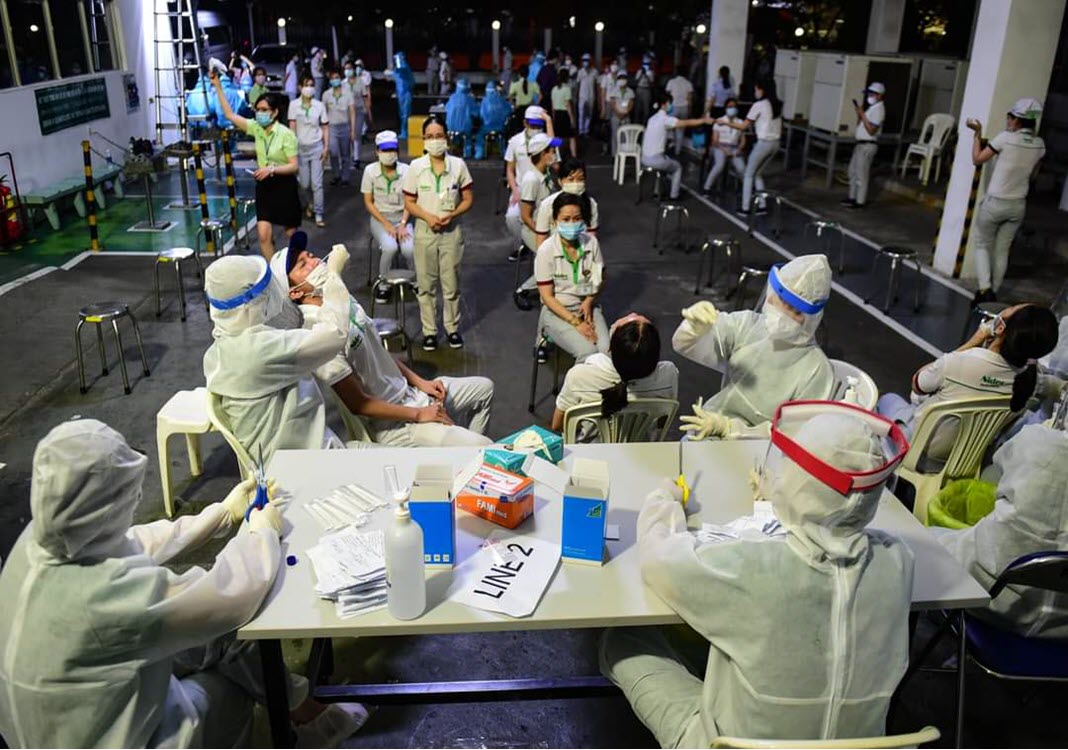The global supply chain is facing a risk: its link in Vietnam may be severed following social distancing measures taken to cope with the Covid-19 pandemic. Some foreign-invested enterprises have had to transfer their contracts to other countries. Their moves also pose a high risk for Vietnam. The authorities in charge should therefore come up with appropriate schemes to cope with the problem.
Reality shows that behind each measure taken or policy formulated by the authorities is the fate of many businesses and the people. Which is why current measures should achieve two goals at a time: curbing the spreading of the pandemic as soon as possible and putting production and services of enterprises across the board back on track. At the time being, recovery is synonymous with development.
As for the management of foreign-invested enterprises (FIEs), the goals also relate to fulfilling the task of retaining foreign investors already in Vietnam and inviting newcomers. Given these purposes, the solutions for the next phase should rely on the following principles.
First, care should be taken to keep at bay possible excessive optimism which may stem from recent positive results in the current fight against Covid-19. From all over the world, health experts have concluded that even when the coronavirus is put under control, we humans will not be able to totally eliminate SARS-CoV-2 from this planet. Instead, humankind have to find ways to live with the virus. Covid-19 must be treated the way we do toward other diseases, new and old.
Secondly, new measures, if any, must be practical, as Prime Minister Pham Minh Chinh has put it when he was on field trips visiting southern localities hit hard by the coronavirus. The ultimate goal remains reaching a dual goal, which is winning over the pandemic and successfully developing the economy.
FIEs have begun moving their contracts out of Vietnam
Now into the third month since the early-July lockdown imposed to combat the fourth resurgence of Covid-19 in Vietnam, a huge number of domestic enterprises are facing the question as to continuing production or closing it down. Some FIEs have had to shift the orders they have received to other countries. According to a representative of the European Chamber of Commerce in Vietnam (EuroCham), up to 18% of its members have transferred orders to other nations and 16% are considering doing so.
If stringent lockdown rules are extended indefinitely, which is of course more harmful to business situation of enterprises in Vietnam, domestic and foreign alike, that some European enterprises will depart Vietnam is a quite feasible scenario.
Practical situations at present show that the Vietnam link of the global supply chain may risk breaking. If this does happen, the recovery of the link in Vietnam would be an uphill task which is incredibly more difficult than building it.

The flip side
It is true to say that measures taken to fight the Covid-19 pandemic have come to life opportunely to contribute to the prevention of the SARS-CoV-2 virus. However, as has been mentioned above, there are two sides of every coin. Take for example, the “three-on-the-spot” regulation with which an enterprise may continue its operations (workers working, resting and eating in the same place). This rule can be applicable to businesses for a while. However, it should last for a short time and should not be extended forever. Being an unconventional measure, it will be unbearable to both business owners and workers when it comes to costs and mental health.
Arguably, amidst the raging pandemic when having to confront the surging number of infections and deaths, as well as the overload of the healthcare sector, governments at all levels have to tolerate the measures. However, some regulations have been put into use without paying due attention to production of enterprises, particularly larger ones, with sizable work force, which play the key role in the economy.
To partly relieve the hardships imposing on enterprises and urgent social issues, the first thing to do is to come up with more practical measures for combating Covid-19 so as to enable the corporate sector to work more normally in the framework of regulations suitable to the new situation. The most optimal measures should allow businesses to have ample human resources, retain their production and execute already signed contracts. In other words, they should be feasible and for long-term purposes.
First, safety for enterprises in fighting the coronavirus must be ensured by giving priority to the vaccination of all the work force of all enterprises. For the immediate future, when there are not sufficient vaccines, the personnel of enterprises producing exports and big enterprises should be inoculated first.
Secondly, practical efficiency of the measures employed to fight the pandemic must be assessed to work out longer-term schemes. Investments made by enterprises across the board, FIEs or otherwise, are a long-term process. Therefore, the measures put into practice should not be short-term.
The following scenario is really a dilemma for an enterprise. This enterprise has imported quite a few input materials and equipment for the whole year. All of a sudden, one worker in the production line contracted the coronavirus, and the entire line has to be quarantined, which puts on hold the whole enterprise. Is such a rule totally effective in all aspects? Or is it necessary to go deeper into a specific case and the place where the incident occurs so as to come up with a more appropriate decision which helps both fight the pandemic and ensure the enterprise’s production?
A note should be taken here. The authority of local industrial park (IP) should not issue documents on building recovery plans of the enterprises in the IP, hinging upon only short-term scenarios. Instead, an announcement should be made of the application of new measures for fighting the pandemic and recovering production in line with regulations and instructions given by local and central government agencies.
To reduce the negative effects of the anti-Covid-19 measures currently in use, officials of agencies in charge of enterprise management and those responsible for the pandemic should sit together to talk with relevant company representatives to consider the practical situation of each enterprise. These officials should discuss with and listen to the representatives about the latter’s proposals. In specific cases, some exclusive measures suitable to a number of businesses which meet the same conditions can be considered for implementation. In the current context, it may be impractical to expect universal solutions which meets requirements of all forms of enterprises.
Also, it is time for leaders of localities to sit together to discuss with the corporate sector ways to bring back to industrial hubs workers who have returned to their home provinces. Currently, social distancing measures have just been loosened in some provinces and cities so that production and services can be partly resumed. Yet some IPs, for instance those in Thai Nguyen, have already made complaints about their lack of workers.
By Dr. Phan Huu Thang(*)









